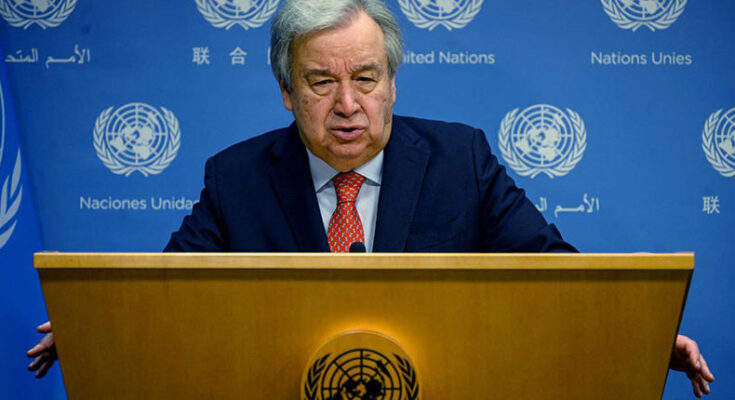Global warming era is over, now time for boiling begins – Antonio Guterres. Image Courtesy – DW
Recently a statement was made by António Guterres, the Secretary-General of the United Nations. Climate change is indeed an urgent and global challenge that requires immediate and decisive action from all countries and leaders.
The impacts of climate change are becoming increasingly evident and severe, affecting communities, ecosystems, and economies worldwide. To address this crisis, it is crucial for world leaders to come together and take collective responsibility to combat global warming.
Global warming refers to the long-term increase in the Earth’s average surface temperature due to human activities and also natural processes. The primary cause of global warming is the enhanced greenhouse effect, which is caused by the accumulation of greenhouse gases (GHGs) in the Earth’s atmosphere.
Greenhouse gases, such as carbon dioxide (CO2), methane (CH4), nitrous oxide (N2O), and fluorinated gases, act like a blanket, trapping heat from the sun in the Earth’s atmosphere. This natural greenhouse effect is essential for maintaining a habitable climate on Earth. However, human activities, such as burning fossil fuels (coal, oil, and natural gas), deforestation, industrial processes, and agricultural practices, have significantly increased the concentration of greenhouse gases in the atmosphere.
The consequences of global warming are far-reaching and impact various aspects of the environment and human life. Some of the key effects include:
Rising temperatures: Global average temperatures have been increasing over the past century, resulting in more frequent and intense heat waves.
Melting ice and rising sea levels: Higher temperatures cause glaciers and ice caps to melt, leading to rising sea levels. This poses a severe threat to coastal communities and ecosystems.
Extreme weather events: Global warming has been linked to an increase in the frequency and intensity of extreme weather events, such as hurricanes, droughts, floods, and wildfires.
Ocean acidification: The excess CO2 in the atmosphere is absorbed by the oceans, leading to ocean acidification, which can harm marine life, particularly organisms with calcium carbonate shells (e.g., corals, mollusks).
Disruption of ecosystems: Many plant and animal species are struggling to adapt to the rapid changes in their habitats, leading to shifts in ecosystems and potential biodiversity loss.
Health impacts: Global warming can have direct and indirect effects on human health, including heat-related illnesses, the spread of infectious diseases, and food and water insecurity.
Addressing global warming requires global cooperation and efforts to reduce greenhouse gas emissions, transition to renewable energy sources, increase energy efficiency, protect and restore forests, and adopt sustainable agricultural practices.
The 2015 Paris Agreement is a crucial international accord that aims to limit global warming to well below 2 degrees Celsius above pre-industrial levels and to pursue efforts to limit it to 1.5 degrees Celsius. Countries are required to set and regularly update their emissions reduction targets, with the ultimate goal of achieving a carbon-neutral world in the second half of the 21st century. Individual actions, policy decisions, and technological advancements all play a role in mitigating the impacts of global warming and safeguarding the planet for future generations.
Read: Tropical Cyclones are getting intensified by Climate Change
Waiting for others to act is no longer a viable option, as time is of the essence. The longer we delay taking action, the more difficult and costly it will be to mitigate the effects of climate change and adapt to its consequences.
Fortunately, there are numerous significant opportunities to tackle climate change effectively:
Renewable Energy: Transitioning from fossil fuels to renewable energy sources such as solar, wind, hydro, and geothermal power can significantly reduce greenhouse gas emissions.
Energy Efficiency: Implementing energy-efficient technologies and practices in industries, buildings, and transportation can lower energy consumption and emissions.
Reforestation and Forest Conservation: Protecting existing forests and restoring degraded lands can help sequester carbon dioxide and enhance biodiversity.
Sustainable Agriculture: Promoting sustainable farming practices, agroforestry, and reducing food waste can reduce emissions from agriculture and increase climate resilience.
Climate Finance: Mobilizing financial resources to support climate mitigation and adaptation projects, especially in developing countries, is crucial for global efforts.
Technological Innovation: Investing in research and development of clean technologies can lead to breakthroughs in climate solutions.
International Cooperation: Collaboration among nations is essential for sharing knowledge, resources, and best practices to address climate change collectively.
Leadership and political will are fundamental in driving these initiatives forward. By embracing these opportunities and committing to ambitious climate action, we can work towards limiting global warming and creating a more sustainable future for generations to come.
India will host the G20 summit this year. Regarding the G20 summit and high-level General Assembly session to be held in Delhi, United Nations chief Antonio Guterres says that this is an important opportunity to take action on climate change. The era of global warming is over. It has now become global boiling.
The month of July was the hottest month in human history
Guterres explained that humanity is on the hot seat. Let us tell you, a committee of the Meteorological Organization and the European Commission has said that July 2023 could be the hottest month in human history. Along with North America, Asia, Africa, and Europe, it is dangerous for the whole earth. Guterres said that climate change is dangerous. This is only the beginning. The era of global warming is over. The era of global boiling has arrived. We cannot breathe because of polluted air. Ultimately, the heat is becoming unbearable.
Need for action due to rising temperature
Guterres has addressed all the world leaders that there should be no hesitation about climate change. No excuse will do. Now the time has gone to wait for others. We need very quick action due to the rising of temperature. We have many significant opportunities. Africa Climate Summit. G20 Summit. United Nations Climate Ambition Summit. COP 28. India took over the presidency of the G20 on December 1 last year. The G20 summit will be held in New Delhi on September 9-10.
Guterres urged to save people
Expressing concern, the UN chief said that extreme weather conditions are now becoming normal. Guterres has asked all countries to protect their people from extreme heat, floods, storms, and droughts. He said that the promises made regarding international climate finance should be fulfilled.





